Articles
- Page Path
- HOME > Korean J Community Nutr > Volume 21(1); 2016 > Article
-
Research Article
- Job Perception and the Need for Job Improvement among School Nutrition Teachers in Seoul
-
Seoung-Hee Kim, Kyung-Eun Lee
 , Jin-Sook Kim
, Jin-Sook Kim -
Korean Journal of Community Nutrition 2016;21(1):12-24.
DOI: https://doi.org/10.5720/kjcn.2016.21.1.12
Published online: February 29, 2016
1Shinjeong Elementary School, Seoul, Korea.
2Department of Food and Nutrition, Seoul Women's University, Seoul, Korea.
3Association of School Nutrition Teachers, Korea.
- Corresponding author: Kyung-Eun Lee. Department of Food and Nutrition, Seoul Women's University, 621 Hwarang-ro, Nowon-gu, Seoul 01797, Korea. Tel: (02) 970-5648, Fax: (02) 976-4049, klee@swu.ac.kr
Copyright © 2016 The Korean Society of Community Nutrition
This is an Open-Access article distributed under the terms of the Creative Commons Attribution Non-Commercial License (http://creativecommons.org/licenses/by-nc/3.0/) which permits unrestricted non-commercial use, distribution, and reproduction in any medium, provided the original work is properly cited.
- 1,256 Views
- 0 Download
- 1 Crossref
Abstract
-
Objectives
- The objectives of the study were to investigate the school nutrition teachers' perception on their job and to find out recommendations needed for its improvement in order to provide a quality foodservice and nutrition education at schools.
-
Methods
- A total of 219 school nutrition teachers in Seoul were surveyed using self-administered questionnaires.
-
Results
- The perceived importance of the 16 job duties was rated 3.8 based on a 5-point scale (1: very unimportant - 5: very important). The importance of six duties including nutrition management, production management, nutrition education, and food safety management were rated over 4 point but that of record-keeping for documents, official reporting, and service management was rated the lowest. Importance-Performance Analysis showed that nutrition management, receiving/storage management, production management, menu management, food safety management, and equipment/facilities management should be emphasized to maintain the current performance of duties. The performance of the nutrition education and counseling needed to be improved since the importance scores were greater than average but the performance scores were lower than the average. Official reporting and miscellaneous jobs were rated the highest for simplification need. More than half of the respondents agreed that equipment/facilities management, miscellaneous jobs, service staff supervision, and service line supervision could be allocated to other school departments.
-
Conclusions
- School nutrition teachers should invest more time and resources on their core job duties such as nutrition management, production management, food safety management, and nutrition education for providing quality foodservice and nutrition education. To reflect the environmental changes of school foodservice, a reasonable staffing index of school nutrition teachers needs to be developed. In addition, hiring an assistant or implementing school nutrition teacher internship programs can be useful to reduce workloads of the nutrition teachers.
- 1. Ministry of Education. Report of 2010 School Health Examination Survey(Press Release) [internet]. Ministry of Education; 2011; cited 2015 Oct 21]. Available from: http://www.moe.go.kr.
- 2. Ministry of Education. Report of 2014 School Health Examination Survey [internet]. Ministry of Education; 2015; cited 2015 Oct 21]. Available from: http://www.moe.go.kr.
- 3. Ministry of Education. 2014 School Food Service Statistics [internet]. Ministry of Education; 2015; cited 2015 Oct 21]. Available from: http://www.moe.go.kr.
- 4. Ministry of Government Legislation. School Food Service Regulation [internet]. Ministry of Government Legislation; 2013; cited 2015 Oct 21]. Available from: http://www.law.go.kr.
- 5. Kwak TK, Ryu ES, Lee HS, Hong WS, Chang HJ, Choi JH, Yi NY. Foodservice management. 2nd ed. Seoul: Shinkwang Publishing; 2014. p. 209-210.
- 6. Lee KE, Shin KH. Job burnout, engagement and turnover intention of dietitians and chefs at a contract foodservice management company. J Community Nutr 2005; 7(2): 100-106.
- 7. Lee Y, Yang I, Cha J. The importance and categorization of task elements of school food service dietician. Korean J Nutr 2002; 35(6): 668-680.
- 8. Lee Y, Yang I, Cha J, Yoo T. The development of standard and disposition for effective job performance of school food service dietician. Korean J Nutr 2002; 35(7): 800-817.
- 9. Moon HK, Jang YJ. Analysis of the dietitian's job description in the school. J Korean Diet Assoc 2002; 8(2): 143-153.
- 10. Shin K, Shin E, Park Y, Kim H, Bae I, Lee Y. A survey on the perceived importance and difficulty to set up the job duties of nutrition teachers in elementary school. J Korean Diet Assoc 2006; 12(2): 105-117.
- 11. Kim D, Han S, Rho J. Job analysis of school foodservice dietitians in Chonbuk area. Korean J Hum Ecol 2007; 10(3): 1-15.
- 12. Kim MA, Lee YS, Rho JO. Analysis of perceived management performance and importance level of nutrition teachers by school administrators in the Chonbuk area of Korea. Korean J Food Nutr 2010; 23(2): 203-211.
- 13. Lee MJ, Jang MS, Lee JM. Analysis of recognized changes in performance and organizational environment by dietitians transposed to nutrition teachers in Gyeonggi province. J Korean Diet Assoc 2008; 14(3): 243-258.
- 14. Yang I, Lee Y, Cha J, Yoo T, Chung L. Work measurement of dietetic staff through work sampling methodology in school foodservice systems. Korean J Nutr 2002; 35(2): 263-271.
- 15. Lee K. Requirements and self-evaluation of competencies necessary to be effective nutrition teachers perceived by school food service dieticians. J Korean Soc Food Sci Nutr 2009; 38(5): 626-635.Article
- 16. Chung MO, Seo SH. School dietitians' perceptions of potentially hazardous food and inspection of food safety and sanitation. J Korean Diet Assoc 2008; 14(2): 176-185.
- 17. Park YH, Kim HH, Shin KH, Shin EK, Bae IS, Lee YK. A survey on practice of nutrition education and perception for implementing nutrition education by nutrition teacher in elementary schools. Korean J Nutr 2006; 39(4): 403-416.
REFERENCES
Quadratic analysis of perceived importance and need for job simplification by job duty categories
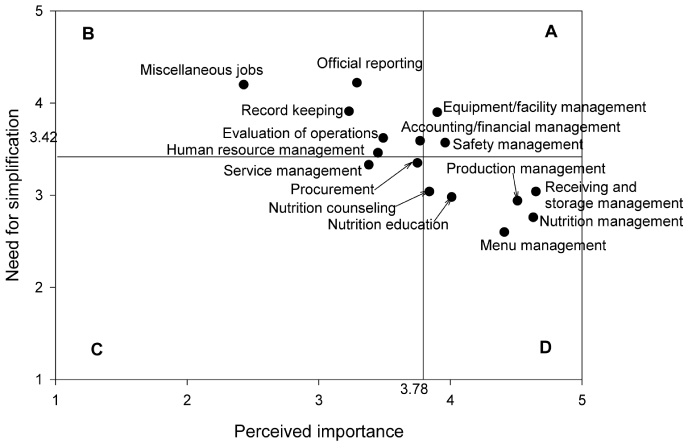
Quadratic analysis of perceived performance and need for job simplification by job duty categories
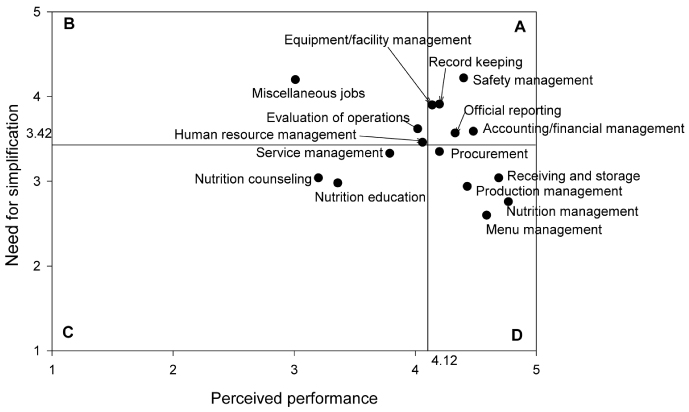
Perception of nutrition teachers on importance and performance of tasks in school foodservice
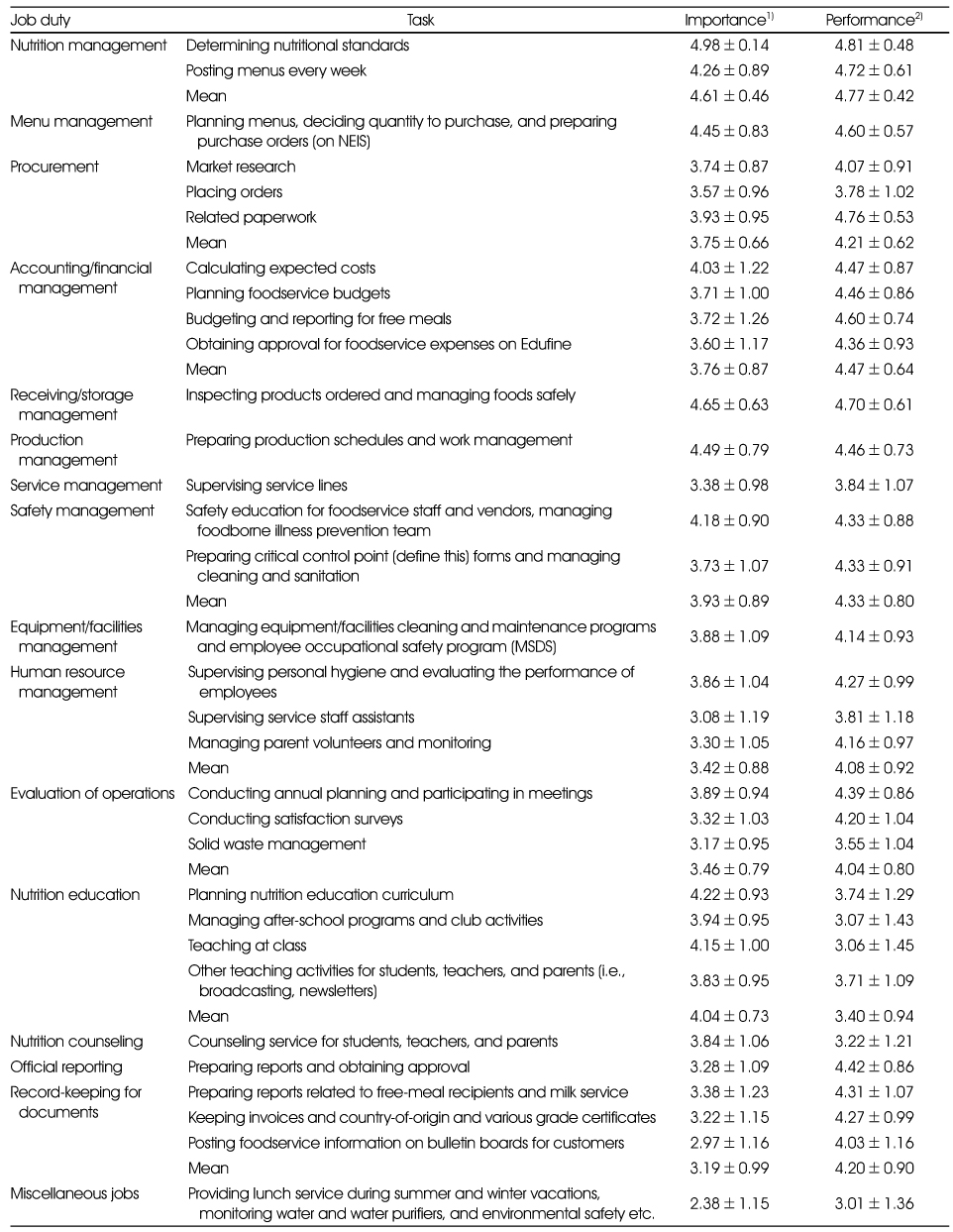
Perception of nutrition teachers on importance of tasks in school foodservice by age and number of students
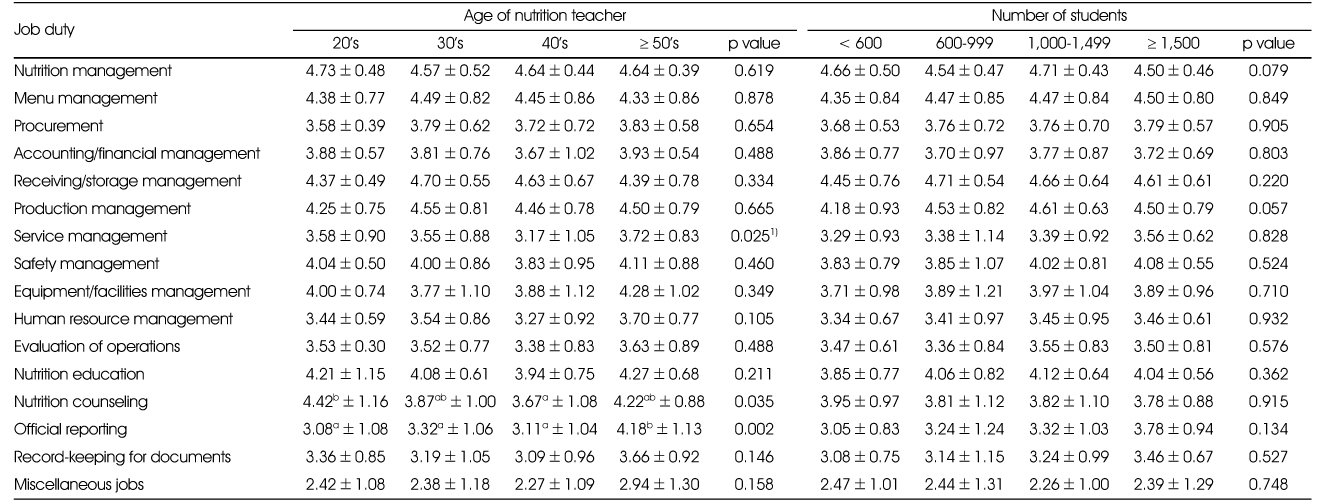
Figure & Data
REFERENCES
Citations

- Importance, performance frequency, and predicted future importance of dietitians’ jobs by practicing dietitians in Korea: a survey study
Cheongmin Sohn, Sooyoun Kwon, Won Gyoung Kim, Kyung-Eun Lee, Sun-Young Lee, Seungmin Lee
Journal of Educational Evaluation for Health Professions.2024; 21: 1. CrossRef
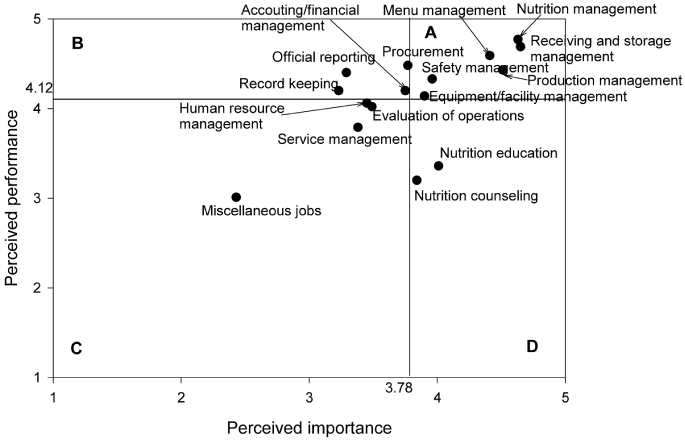


Fig. 1
Fig. 2
Fig. 3
General characteristics of the respondents
Perception of nutrition teachers on importance and performance of tasks in school foodservice
1) A five-point scale was used (1: very unimportant - 5: very important).
2) A five-point scale was used (1: never perform - 5: perform very well).
Perception of nutrition teachers on importance of tasks in school foodservice by age and number of students
A five-point scale was used (1: very unimportant - 5: very important).
1) Significant differences were not found by Duncan, Tukey, nor Boferroni post hoc tests.
ab: Different superscripts in the same row mean significant differences by Duncan's post hoc test.
Perception of nutrition teachers on performance of tasks in school foodservice by age and number of students
A five-point scale was used (1: never perform - 5: perform very well).
ab: Different superscripts in the same row mean significant differences by Duncan's post hoc test.
Perception of nutrition teachers on needs for work simplification and reallocation of tasks
1) A five-point scale was used (1: very unnecessary - 5: very necessary).
2) Frequency (%)
1) A five-point scale was used (1: very unimportant - 5: very important). 2) A five-point scale was used (1: never perform - 5: perform very well).
A five-point scale was used (1: very unimportant - 5: very important). 1) Significant differences were not found by Duncan, Tukey, nor Boferroni post hoc tests. ab: Different superscripts in the same row mean significant differences by Duncan's post hoc test.
A five-point scale was used (1: never perform - 5: perform very well). ab: Different superscripts in the same row mean significant differences by Duncan's post hoc test.
1) A five-point scale was used (1: very unnecessary - 5: very necessary). 2) Frequency (%)

 KSCN
KSCN

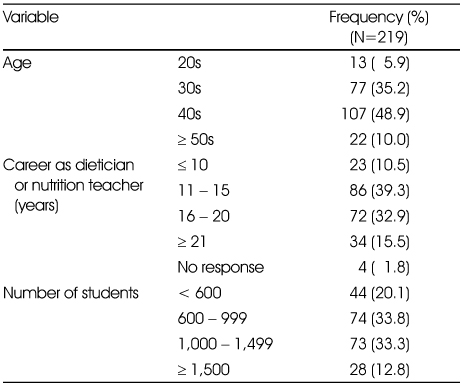
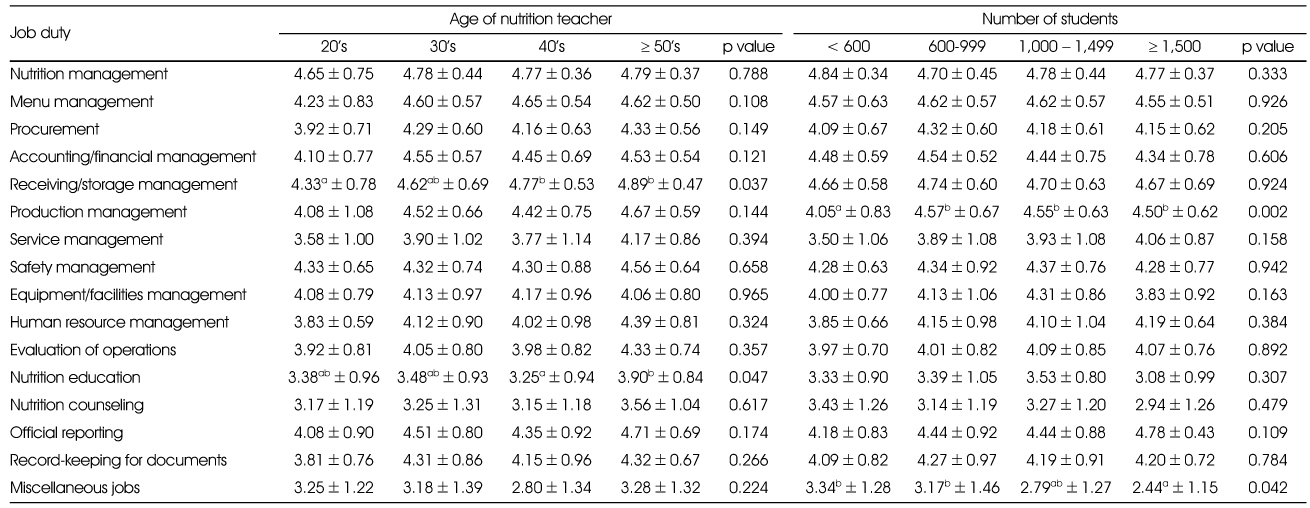
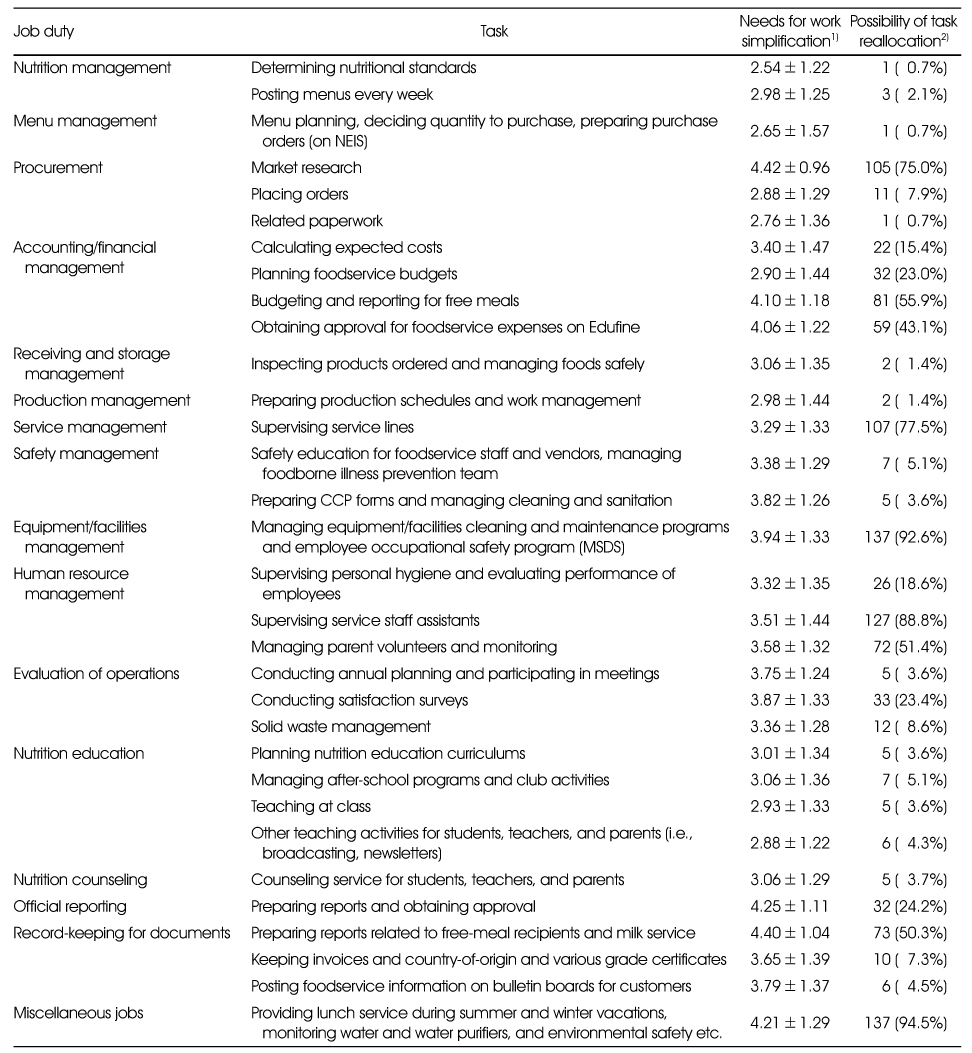
 Cite
Cite


